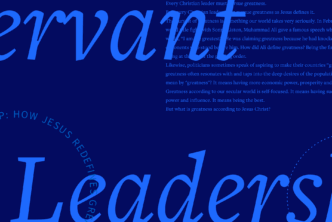Names often serve an important rhetorical function in biblical literature.1 In Genesis 22, a new epithet for God is given, Jehovah Jireh, which is often translated as “the LORD will provide” and, when used as a name, “the LORD my provider” (see ESV, NKJV, NASB, NIV, etc.). Any time the LORD’s name is altered in the Bible, it tends to be of some significance.2 The various names for God have been the focus of numerous academic studies, devotional literature, and worship songs.3
Divine names are theologically significant, making them a proper object of study and reflection. What must be ascertained for Genesis 22 is the nature of God’s provision. This study will seek to ascertain the meaning of “Jireh” in this passage, and, in so doing, will show an often-missed rhetorical contrast to the Hagar narrative. When this contrast is discerned, we will see how this narrative contributes to the Genesis narrative’s consistent portrayal of God’s concern for the welfare of Abraham’s descendants.
Context
The patriarchal narratives detail the account of a broken family in the process of being restored through supernatural intervention for a missional purpose.4 Abram and Sarai are without a child in Haran when God conscripts Abram for service through a promised land grant (Gen 12:1, 7). This land grant, similar to Suzerain treaties of the ancient Near East, included certain stipulations and provisions.5 Abram was to leave his father’s house and go to the land that God would show him, forming the vassal stipulations. Upon arrival, Abram would receive the blessing of God, the protection of God, multiple descendants, and be given a certain portion of land (Gen 12:7, 13:14). This grant is elaborated in multiple places in the patriarchal narratives and is typically referred to as the Abrahamic covenant or the Abrahamic promise.6
Abraham and Sarah remain childless for a century until the Lord God visits them, as promised; and the miracle child Isaac is born (Gen 21). But something happens in Genesis 22 that the reader is not expecting. The LORD seeks to test Abraham by commanding him to offer up Isaac as a burnt sacrifice. During the trek, Isaac asks his father of the location of the lamb for the burnt offering, and Abraham responds, “God will see to the lamb for the sacrifice himself, my son” (Gen 22:8). This is my own very literal translation; however, many others have translated the common Hebrew idiom more pragmatically with something similar to “God will provide for himself the lamb for a burnt offering” (Gen 22:7 ESV). As Abraham climbs the mountain of the LORD, his long-awaited son whom he has been asked to sacrifice asks him where the sacrifice is. Abraham looks at his son, the sacrifice, and tells the boy, God himself will see to it. Eventually, Abraham and Isaac reach their destination, Abraham binds his son, raises the knife, and prepares to deal the death blow. He is stopped by the audible intervention of the angel of the LORD who gives a divine commendation for his obedience and reveals a ram stuck in a thicket. Abraham passed the test mentioned in 22:1, the boy is safe, and as Abraham had mentioned, God saw to the offering himself. This new experience between the LORD and Abraham resulted in a new adjective to be appended to the name of the LORD, Jehovah Jireh (or YHWH Yireh) and a Hebrew proverb. “And Abraham called the name of that place ‘The LORD will see to it,’ which it is said to this day, ‘In the mountain of the LORD it will be seen to’” (Gen 22:14, my translation). What does that mean?
The word יראה
The word יראה is derived from the word ראה, “to see.”7 The form appears in qal imperfect form in verses 8 and 14a, while the second occurrence in 14 is in the niphal imperfect. William Reyburn and Euan Fry note that the initial occurrence in verse 8 is a “Hebrew idiom that is literally ‘will see for himself.’ The sense is ‘God will look after the need for a lamb’” with an emphasis on God’s sole agency.8 Since the same Hebrew word is used in verse 14, Reyburn and Fry also suggest that the verbs in verses 8 and 14 should correspond, whether using the common “see” or the more colloquial sense of “provide.”9
The problem of translating idioms
Translating idioms can be notoriously difficult.10 The translator is forced to choose between accessibility for a target audience and literal faithfulness to the text which at times has literary implications. Robert Alter has sought to “to resist the notion of ‘dynamic equivalence’” noting that, “to transpose the verbal formulations and idioms of the Bible into different ones that are entirely indigenous to the modern target language” can “make the ‘message’ of the Bible more immediately accessible to readers in the many far-flung cultures where it is now read, but it inevitably entails a palpable degree of misrepresentation of the Bible’s literary vehicle.”11 Such a problem exists in Genesis 22. By giving the pragmatic sense of יראה, “provide” instead of the literal “see,” one misses important intertextual allusions within Genesis itself, and particularly within the Abrahamic narrative.
A contextual and canonical reading
By maintaining the literal translation through verbs of sight, one immediately recognizes that this narrative has a direct correspondence to the Hagar narrative of Genesis 16. In Genesis 16, Hagar is oppressed by Sarai with Abram’s permission and rebelliously flees to the desert. God appears to her, promises her protection, and the child a blessed future of prominence (Gen 16:11–12). As a result of this theophany, Hagar gives God and the place of visitation a new name, which both incorporate verbs of seeing. She calls God אל ראי and the place of the spring באר לחי ראי, which translates as “the God who sees me,” and “the Well of the Living One who Sees Me.” Similarly, in Genesis 22, the reader finds the promised child Isaac in danger of disappearing from the biblical narrative. Unlike the despondent Hagar of Genesis 16, Abraham by contrast is resolute in his faith that Isaac will survive as seen in his reply in verse 8. From a canonical reading, the book of Hebrews informs the Christian reader that Abraham knew that if need be, God would raise Isaac from the dead (Heb 11:17–19). Though there may be a temporary break in the family, Abraham knew that when this was all over, he and Isaac would again be a proper family because the LORD would see to it.
When God did see to it, through the angel of the LORD and the provision of the ram, Abraham responded in worship describing God with a new adjective and renaming the place of the theophany. The Lord showed himself in that place to be Jehovah Jireh, “the LORD who provides/sees to it,” so that the mountain was later known as “the Mountain of the LORD” where the LORD saw to it. Through a contextual reading of Genesis, one can see a deliberate contrast between Hagar’s despondency and rebellion to God’s plan in Genesis 16, compared to Abraham’s obedience to God’s plan and faith exhibited in Genesis 22. In both cases, whether the protagonists are plagued by despondence or filled with faith, God is watching over the family of Abraham to protect the well-being of Abraham’s offspring—whether elect Isaac or non-elect Ishmael. This theme of protection for Abraham’s descendants is central to the message of Genesis, and particularly important in type scenes throughout the Pentateuchal account, as I have noted elsewhere concerning the pre-Sinaitic well scenes.12 Genesis 22’s correlations to Genesis 16 seem to suggest that the Genesis 22 is a correction to the faulty response of Hagar in Genesis 16. Genesis 22 displays God’s oversight of Abraham’s descendants (Isaac and Ishmael) but focuses on his particular concern with the cultic participation of Isaac’s line by emphasizing God’s provision of a substitutionary sacrifice in the context of worship (22:8, 14).
Conclusion
Abraham finds himself in a broken family filled with drama throughout the early narrative due to the Hagar debacle. Despite all the brokenness which fills Abraham’s home life, God is working to fulfill his promise to Abraham to bless him with descendants as numerous as the stars (Gen 15:5). Through Abraham’s faith, evinced by his unquestioning obedience, God is forging a way for Abraham’s descendants to be reconciled to God through a substitutionary sacrifice which God alone can provide. This sacrifice would be seen by the LORD, but the LORD himself would have to see to its accomplishment. Since God is the one who is watching over the patriarchal family, whether elect or non-elect, God is uniquely qualified to see to the family’s well-being. God sees to both Ishmael and Isaac’s physical well-being in Genesis 16 and 22; but he sees to Isaac’s spiritual well-being by seeing to the provision of a substitutionary sacrifice for worship in Genesis 22. What God sees literally, and what he provides for, is the spiritual well-being and physical safety of his people as they obediently take part in his redemptive purposes by following his divine commands. This account implies, and the author of Hebrew’s makes explicit, that this provision of well-being may even be accomplished through death and resurrection.13
The Abraham narrative only explains the fulfillment of one aspect of the Abrahamic promise: the beginning of Abraham’s descendants who are growing as numerous as the stars (Gen 15:5). The rest of the Pentateuch and Joshua will begin to deal with the aspect of the land grant.14 The Abrahamic covenant is portrayed as being progressively fulfilled throughout the Bible, and still awaits final fulfillment.15 The Abrahamic covenant has, and will, find its ultimate fulfillment in Jesus Christ as “all nations of the earth” are in the process of being blessed through Abraham’s ultimate descendant, Jesus Christ. This blessing has been initiated through the spread of the gospel and awaits final consummation. Jesus Christ, as God in the flesh, saw to the substitutionary sacrifice himself when he died on the cross as the lamb of God (John 1:29). The lamb was sacrificed on the mountain of the LORD as a substitution for the sins of mankind (John 11:50–53). Now all who have faith in Christ’s substitutionary work on the cross can be recognized as sons of Abraham (Gal 3:7). The spiritual offspring of Abraham can now enjoy the same provision of spiritual well-being as Isaac did with God because God himself has seen to the provision of the Lamb’s substitutionary sacrifice (Acts 2:23).
Study Jehovah Jireh in greater depth with these resources referenced above
Hebrew and Aramaic Lexicon of the Old Testament | HALOT (5 vols.)
Regular price: $159.99
- Walter Baumgartner, Köhler Ludwig, and Johann Jakob Stamm, “שם,” in The Hebrew & Aramaic Lexicon of the Old Testament, vol. 4 (Leiden: Brill, 1994), 1598, which notes the practice of giving individuals honorific names to describe their standing or reputation. The issues of names and God’s titles are discussed in Frank Moore Cross, Canaanite Myth and Hebrew Epic: Essays in the History of the Religion of Israel (Cambridge, MA: Harvard University, 1997), 1–75.
- Gerhard von Rad, Old Testament Theology, trans. David Stalker (New York, NY: HarperSanFrancisco, 1962), 1:179–83.
- One such song by Vicki Yohe, “Because of Who You Are,” includes a line in the chorus: “You’re Jehovah Jireh, my provider” and comes directly from the Genesis 22 account. Vicki Yohe, “Because of Who You Are,” Pure Springs Gospel, 2003.
- Paul R. House, Old Testament Theology (Downers Grove, IL: InterVarsity Press, 1998), 71–72.
- K. A. Mathews, Genesis 11:27–50:26, vol. 1b (Nashville, TN: Broadman & Holman Publishers, 2005), 22–23; Gordon J. Wenham, Genesis, vol. 1a (Dallas, TX: Word Incorporated, 1987), 333.
- John Sailhamer, The Pentateuch as Narrative: A Biblical–Theological Commentary (Grand Rapids, MI: Zondervan, 1992), 139, 148–52.
- Baumgartner et al., “ראה,” in The Hebrew and Aramaic Lexicon of the Old Testament, 3:1161.
- William D. Reyburn and Euan McGregor Fry, A Handbook on Genesis (New York, NY: United Bible Societies, 1997), 492.
- Reyburn and Fry, Handbook on Genesis, 496.
- Amineh Adelnia and Hossein Vahid Dastjerdi, “Translation of Idioms: A Hard Task for the Translator,” Theory and Practice in Language Studies 1, no. 7 (January 2011): 879–83.
- Robert Alter, The Art of Bible Translation (Princeton, NJ: Princeton University Press, 2020), 23.
- Donald C. McIntyre, “A Narrative Analysis of Pre-Sinaitic Well Scenes,” Journal of Ministry and Theology 25, no. 2 (December 2021): 3–50.
- R. W. L. Moberly, “Christ as the Key to Scripture: Genesis 22 Reconsidered,” in He Swore an Oath: Biblical Themes from Genesis 12–50, ed. Richard S. Hess, P. E. Satterthwaite, and Gordon J. Wenham, 2nd ed. (Eugene, OR: Wipf & Stock Publishers, 2007), 143–73, 170.
- Gerhard von Rad, The Problem of the Hexateuch and Other Essays (London: SCM Press, 1984), 79–93.
- Walter C. Kaiser, “Kingdom Promises as Spiritual and National,” in Continuity and Discontinuity: Perspectives on the Relationship between the Old and the New Testaments, ed. J. S. Feinberg and S. L. Johnson (Wheaton, IL: Crossway, 1988), 288–306.






